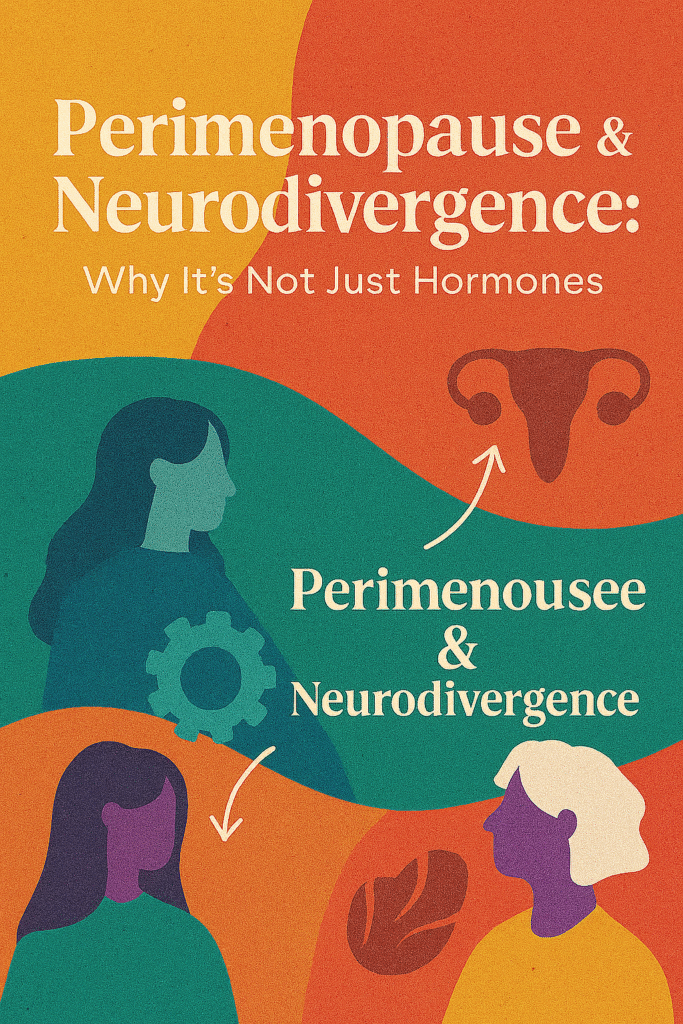For many women, perimenopause arrives like a fog, subtle at first, then suddenly disorienting. Mood swings, sleep disruption, anxiety, and a sense of “losing yourself” are common. But for neurodivergent women, those with ADHD, autism, sensory processing differences, or other neurodivergent profiles — this transition can feel less like a fog and more like a storm.
As both a therapist and a neurodivergent woman navigating perimenopause myself, I’ve come to understand just how layered this experience can be. The emotional, cognitive, and sensory shifts aren’t just hormonal — they’re deeply intertwined with how our brains process change, stress, and internal signals.
🧠 Why Perimenopause Hits Differently for Neurodivergent Women
Perimenopause is the phase leading up to menopause, often beginning in the late 30s to mid-40s. Oestrogen and progesterone levels fluctuate, affecting everything from mood to memory. But for neurodivergent women, these hormonal changes interact with an already sensitive nervous system.
Here’s what the research tells us:
- Executive Functioning Decline: Women with ADHD often report a significant drop in focus, organisation, and emotional regulation during perimenopause. This is due to estrogen’s role in regulating dopamine, a key neurotransmitter for attention and motivation. Hegvik et al., 2020
- Sensory Sensitivity Increases: For autistic women, sensory overwhelm can intensify. Hot flashes, disrupted sleep, and heightened emotional reactivity can feel unbearable when layered onto existing sensory processing differences. Moseley et al., 2021
- Masking Fatigue: Many neurodivergent women have spent years masking — adapting their behaviour to fit neurotypical expectations. Perimenopause often strips away the energy to maintain these masks, leading to emotional burnout and identity confusion.
💬 My Journey: From Fog to Clarity
I remember going for a walk after work in the afternoon, overwhelmed by a wave of anxiety that felt disproportionate to the moment. I’d forgotten a simple task — something I’d normally brush off — and suddenly I was spiralling. It wasn’t just forgetfulness. It was a deep sense of disconnection from myself.
As I began to explore the intersection of perimenopause and neurodivergence, things started to make sense. The emotional intensity, the sensory shifts, the need for solitude, they weren’t signs of weakness. They were signs of transition. And they needed compassion, not correction.
🌱 What Helps: Therapeutic Tools & Self-Support
If you’re navigating this terrain, here are a few gentle strategies that can help:
- Body Mapping: Track your sensory and emotional shifts across your cycle. This helps you anticipate and respond to changes with more compassion.
- Cognitive Restructuring: Challenge the internalised narratives of “I’m failing” or “I’m too much.” Replace them with: “My brain is adapting. I’m learning to support it.”
- Sensory Supports: Weighted blankets, noise-cancelling headphones, soft lighting — these aren’t indulgences. They’re tools for regulation. And I use all of them.
- Boundary Work: Perimenopause often brings clarity about what no longer serves you. Honour that. Say no more often. Rest without guilt.
- Peer Connection: You’re not alone. Seek out neurodivergent-friendly spaces where you can share, laugh, and be understood.
📚 Further Reading & Listening
- We Demand Attention on How Perimenopause and Menopause Impact ADHD Symptoms, and Vice Versa – Additude Magazine (https://www.additudemag.com/menopause-perimenopause-adhd-research/ )
- The Perimenopause Podcast – Hosted by Dr. Louise Newson ( https://www.drlouisenewson.co.uk/podcasts )
- Unmasking Autism – Dr. Devon Price ( https://www.amazon.co.uk/Unmasking-Autism-Incredible-Hidden-Neurodiversity/dp/1800960549 )
- The Menopause Charity – themenopausecharity.org ( https://themenopausecharity.org/)
💛 Final Thoughts
Perimenopause isn’t just a hormonal shift — it’s a neurological, emotional, and existential one. For neurodivergent women, it can feel like everything is changing at once. But with the right support, it can also be a time of deep self-discovery.
If you’re in this season, know that you’re not broken. You’re becoming. And you deserve care that honours every part of who you are.


